The team behind two Michelin-starred London Bridge restaurant Trivet is in the process of opening a second restaurant. Labombe by Trivet occupies the compact space that was previously home to Richard Turner’s GridIron restaurant at the COMO Metropolitan London in Mayfair. Amazingly, the 65-cover dining room has remained vacant since the beginning of the pandemic.
Following their success south of the river, chef Jonny Lake and sommelier Isa Bal have been parachuted in to bring their distinctive take on top-end hospitality to the five-star Old Park Lane hotel, which is also home to Nobu London. Helping them deliver the project will be Evan Moore and Philipp Reinstaller, another chef-sommelier duo.
Labombe by Trivet is described as a wine-forward restaurant and represents an evolution of Lake and Bal’s Snowfields flagship’s popular Monday night wine bar concept of the same name. While Labombe will share some DNA with its older sibling, including a focus on high-quality ingredients and impactful flavours, the offer will be more flexible and informal, with a menu built around the grill and designed for sharing. Signature dishes from Trivet will be reimagined rather than replicated, with the exception of its cult butter tarts, which nod to Lake’s Canadian roots.
The wine programme will also take a different tack. The list will retain Trivet’s unusual chronological structure but will home in on classic terroirs such as Burgundy, Tuscany, Piedmont and Bordeaux, with a strong emphasis on by-the-glass options. Around 50 wines will be available by the glass, supported by a 650-bin list curated by Bal and Reinstaller. In the following Q&A, the four of them discuss the origins of Labombe, how it differs from Trivet, and what diners can expect when the restaurant opens its doors later this month.
Labombe appears to be made-up word. Can you tell us the story behind it?
Jonny Lake: Labombe means nothing but also everything. When I was about 13 years old, I was tasked with creating a menu for a fictitious restaurant to practise my restaurant French. I’m originally from Canada, where French is an official language. I called it Labombe. It was some 40 years ago, so I have no recollection of doing it, but I found the exercise book a few years ago while helping my parents move. At the time, Isa and I were trying to find a name for a wine bar project that never got off the ground. I showed Isa the book and he said, “That’s it!”
Isa Bal: We ended up repurposing Labombe for our Monday night wine bar nights at Trivet, which offered an exclusive by-the-glass wine selection handpicked by the sommelier, alongside a menu of bar food.
JL: Labombe by Trivet is inspired by those nights, but it’s a restaurant rather than a wine bar.
So, the food at Labombe will be simpler than at Trivet?
Evan Moore: Yes, but it will be more involved than the food served at the wine bar nights, which were run by just two chefs. The dining room here seats 65 and there’s a private dining room too, so we’ll have about six chefs on a service. The kitchen is great, but it’s a galley layout - if we have any more than that, we’ll just get in each other’s way.
JL: Trivet and Labombe have a similar ethos. We focus on high-quality ingredients and big, impactful flavours. Probably the biggest difference is the way the food is served. While it’s possible to share at Trivet, none of the dishes are designed with that in mind. Labombe is much more freeform and flexible, offering a menu of small bites, small plates and larger dishes for sharing.
EM: Our launch menu includes grilled kalettes with pork fat vinaigrette, tuna heart and lemon; confit Delica pumpkin with sherried almond purée, candied almonds, mustard leaf and sage; pink bream pil pil; and crème caramel with bitter Campari caramel. In general, the dishes are a little more stripped back than at Trivet, with fewer elements on the plate. But, in common with Trivet, dishes that might look quite simple involve a lot of different processes to boost flavour and texture.
Will you offer any dishes from Trivet?
EM: With the exception of Trivet’s famed butter tarts, we’re not copy-and-pasting anything. But we will be creating sibling dishes to some Trivet favourites, including a two-bite take on our hot tongue bun and a dish inspired by our breaded veal chop with sweet and sour sauce. We’ll also be offering farinata - a chickpea pancake - with mortadella, which was one of the top sellers at our Labombe nights at Trivet.

How long have you been working together?
JL: Evan did a stage at The Fat Duck in 2009, around the time I became head chef there. Rather embarrassingly, I didn’t end up giving him the job.
EM: I was fresh out of culinary school in Canada. Jonny and I are actually from a very similar area.
JL: I grew up in Burlington and Evan is from Oakville - both close to Toronto. Ultimately, Evan did get a job with The Fat Duck group, first at Dinner and later at Dinner in Melbourne, where he launched the restaurant as head chef. I’d say we worked alongside each other rather than directly together, but we know each other well.
EM: I came back to the UK from Australia about a year ago to help Ashley Palmer-Watts prepare for the launch of his Surrey restaurant (which is now not going ahead). I’ve spent the past few months working at Trivet alongside Jonny, with a focus on the Labombe nights. We’ve also done a lot of research into what other comparable restaurants are serving - not to copy, but to understand what diners want.
Will Labombe approach wine in a similar way to Trivet?
IB: Yes and no. This time, the focus will be on key terroirs in classic regions including Burgundy, Tuscany and Piedmont. We’ll also have a lot of Bordeaux, which is very unfashionable in the UK right now, but I believe the region deserves a second chance. It’s a great source of both fine wines and more affordable wines. There will be less focus on wines from places like Turkey, Greece, Armenia and Georgia but we will have some, because they deserve more recognition than they typically get. Being from Turkey, I’m biased and sometimes ignore their shortcomings.
Trivet’s wine list is ordered by the date each country started producing wine. Will you be doing that again?
IB: Yes. That approach has been a big success for us, but we’ll make less of a big deal out of it this time. What really sets the two lists apart is Labombe’s focus on by-the-glass. We’ll have about 50 available, which is far more than Trivet.
Philipp Reinstaller: We’ll utilise Coravin for some of our more premium options, but it’s important to use it wisely because it adds a lot of cost. We’ll typically be using it for wines that cost more than £25 a glass.
PR: We have a list that’s a little larger than Trivet’s - around 650 bottles.
How long have you two been working together?
PR: I’m also an alumnus of Dinner. I joined Trivet around launch as head sommelier and worked alongside IB and JL for about two years. I’ve recently returned to the Trivet fold, having spent the past few years launching Mauro Colagreco at Raffles London at The OWO.
Will the wine service be similar to Trivet?
PR: Like the food, it will be a little more stripped back and simplified.
IB: We want to make wine a normal thing. We don’t want it to be something that complicates people’s experience. At the end of the day, it’s just something you drink. There’s a time and place for ceremony, but not at Labombe.
You’ve been involved in a lot of high-profile restaurant launches over the years. Does it get easier?
JL: Even when it’s controlled, it feels relentless because there are so many things coming at you. No matter how much experience you have, it’s still like that. The biggest thing is knowing that the list of things you have to contend with each day will get shorter. Solutions to problems will be found. A good senior team helps, and we have that with Evan and Philipp. It’s still exciting - and daunting.


